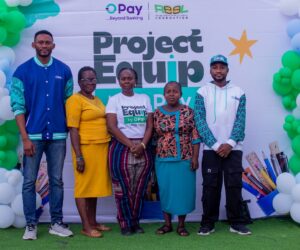2
Jide Oyekunle
A Gender Rights Advocate and Founder Thrive For Her Foundation, Ms.Freda Irabor, has called for the inclusion of menstrual hygiene education in Nigeria’s school curriculum to improve young girls’ understanding and management of their menstrual cycles.

Irabor made the call on Monday during an outreach programme where her organisation distributed over 100 reusable sanitary pads women at the Durumi IDP Camp in Abuja.
She noted that the rising cost of disposable pads has made menstrual products increasingly inaccessible to many families, hence the need for sustainable alternatives.

According to her “We found out that many girls can no longer afford regular sanitary pads,” she said. “So we introduced reusable pads that can last for a year. After use, the girls can wash, dry and reuse them safely. This initiative helps reduce cost and keeps them protected.”
The gender activist emphasised that menstrual hygiene is critical to women’s health, describing women as “the vessels through which life comes into the world.”
“ Poor menstrual hygiene exposes girls and women to serious health risks, including infections, pelvic inflammatory disease (PID), stillbirth and infertility”

She stressed that beyond distributing menstrual products, her foundation also educates beneficiaries on how to properly use and maintain them. “It’s not just about giving them pads,” she added. “We teach them how to stay clean, protect themselves from infections and maintain good hygiene during their periods.”
Irabor also highlighted the stigma and cultural taboos surrounding menstruation in many communities, describing them as barriers that prevent girls from seeking information and support. She urged the government to formally integrate menstrual hygiene education into the national curriculum.
“Many homes still label menstruation as a taboo grounded in culture and tradition,” she said. “If schools teach children that menstruation is a normal biological process, they can also help educate their parents. The government should support this initiative by incorporating menstrual hygiene into school lessons.”
Irabor appealed to partners, donors and stakeholders to support the foundation’s ongoing menstrual health campaigns and reusable pad distribution efforts.
Also speaking at the event a human rights activist and Co-Convener #BringBackOurGirls Movement, Aisha Yesufu commended the Tribe for Her Foundation for its ongoing advocacy on menstrual hygiene, describing the initiative as a crucial intervention for women and girls, especially those living in internally displaced persons (IDP) camps.
She noted that while pads may seem insignificant to some, the lack of access to proper menstrual products has far-reaching effects on women and girls.
“For a lot of people, it stops a lot of activities in their lives,” she said. “We’ve seen young girls missing school because they are unable to afford pads to take care of themselves during their menstruation.”
Yesufu stressed that menstrual hygiene is an essential component of health and development, adding that a healthy woman contributes positively to the well-being of her children and society. “Reproductive health is very important to a nation, and what she (Freda) is doing here is ensuring that women have the tools they need to stay healthy,” she said.
On the issue of stigma surrounding menstruation in some communities, Yesufu said education and awareness remain the most effective tools to eliminate discrimination and harmful cultural practices.
“A lot of people associate menstruation with uncleanness, and that fuels stigma,” she explained. “Proper education will change that. I admire women of this generation who are breaking the silence by speaking openly about menstruation. It is not a taboo; it is a normal biological process.”
She therefore called on the government to prioritise menstrual health by making sanitary products accessible and affordable, noting that some countries have already begun offering free menstrual products to citizens.
On his part a Gender rights advocate and Executive Director Men Against Rape Foundation( MARF), Lemmy Ughegbe, (PhD)
Lemmy Ughegbe decried poor menstrual hygiene just as he called for Government support for women and children.
Ughegbe noted that many displaced women resort to unsafe alternatives due to extreme poverty.
According to him, some women “use all sorts of rags, tissue paper where they can afford and you know the danger and damage it does to their system. In fact, research has even shown that some women from very poor backgrounds even use cow dung in place of menstrual pads.”
He commended the initiative by Thrive For Her Foundation, which invited partner organisations to educate women on proper menstrual hygiene, including how to use and maintain reusable sanitary pads.
“Some people don’t even know how to use sanitary pads,” he said. “The team provided reusable pads and also taught them how to wash and disinfect them properly to avoid infections. The outreach is simply trying to fill a gap, especially as the poverty index expands daily.”
Ughegbe lamented that many residents of the Durumi IDP Camp have been stranded there for 10 to 11 years, living without adequate governmental support despite being citizens who were forcibly displaced.
“These people did not choose to be displaced. Their homes became insecure, and they were ousted. The primary duty of the government is the welfare and security of lives and property,” he said.
He criticised the prolonged stay of displaced persons in makeshift camps, arguing that the government should have long begun relocation or resettlement efforts.
“By now, the government should have relocated them. Even if they are not returning home, proper housing should be built for them. Nigeria has enough resources if it prioritizes the welfare of its citizens,” he added.
Ughegbe described the IDPs as “resilient people” who continue to stay positive despite severe deprivation, noting that even non-displaced Nigerians face high levels of multidimensional poverty.
“If the ordinary citizen outside a camp is already among the 143 million multidimensionally poor, what then is the fate of those in IDP camps?” he asked.
He highlighted the absence of essentials such as water, food, and basic sanitation, stressing that a government struggling to provide these cannot be expected to address menstrual hygiene without deliberate intervention.







